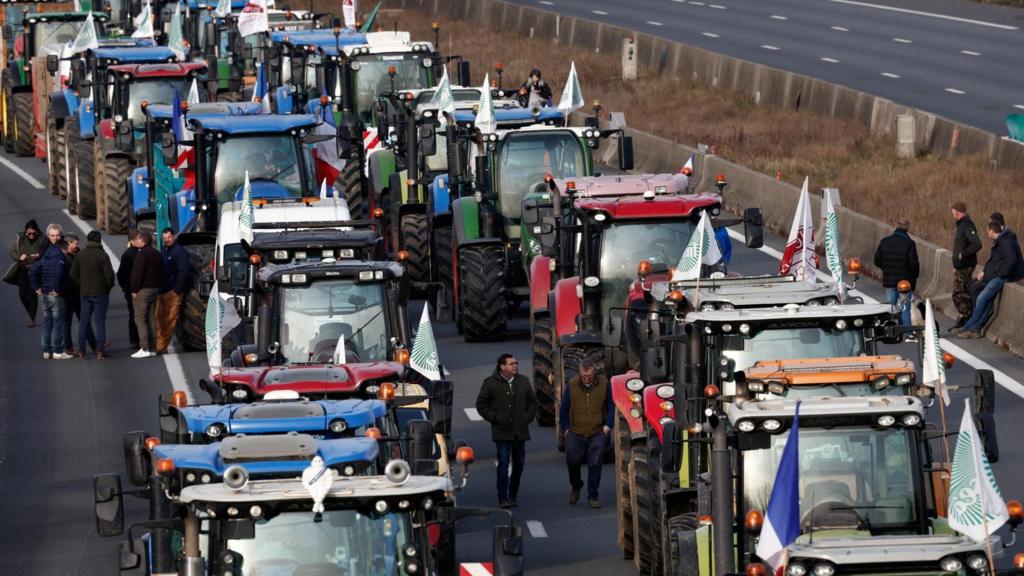
Image Credit BBC
Europe is caught in a tug of priorities. On one side are the numbers—GDP, industrial output, and recovery forecasts. On the other side are people—farmers, workers, and citizens resisting austerity and environmental policies that squeeze livelihoods. The balancing act between economic growth, social stability, and climate responsibility is defining the continent’s trajectory.
Recent headlines capture this tension:
- UK GDP grew 0.3% in July, driven by services, while the Bank of England hesitates to cut rates.
- Germany’s industrial output rose 1.2%, showing signs of a rebound in its auto sector.
- France erupted in nationwide protests against pension reforms, raising the retirement age to 65.
- Spain approved new migrant labor reforms to legalize thousands of undocumented workers.
- Germany recorded its hottest September week ever, sparking calls for urgent climate adaptation.
- France’s farmers protested EU environmental rules, clashing with policies designed for green targets.
The data shows recovery. The streets show resistance. The climate shows urgency. Europe’s social contract is being rewritten in real time.
Growth: The Industrial Engine
Germany’s rebound matters beyond Europe. As one of the world’s largest exporters, its industrial output signals health for global supply chains. For African and Nigerian exporters, German demand creates opportunities in niches like green goods, food imports, and digital services.
But growth built only on factories without social buy-in can’t last. Europe’s engine runs on more than machinery—it runs on people.
Protests: The Social Contract
France’s pension protests and farmer unrest underline a simple truth: economic reforms, however logical on paper, face pushback if they undermine dignity. Europeans are not rejecting competitiveness—they are rejecting competitiveness that demands sacrifice without visible reward.
For businesses trading with Europe, these protests matter. They shape consumer confidence, labor availability, and even policy timelines.
Climate: The Urgent Bill
Germany’s record heatwave and Berlin’s €10bn renewable stimulus show climate is no longer future tense—it’s immediate. The EU’s Green Deal is forcing businesses to meet stricter standards on imports, emissions, and sustainability.
For exporters in Africa and beyond, this means new compliance costs but also new demand for green-aligned goods. Those who adapt win markets. Those who ignore get locked out.
Why This Matters for Businesses
If you export or plan to trade with Europe, here’s the reality:
- Growth creates demand → but in resilient, green-aligned sectors.
- Protests reshape policy → reforms may stall or change direction.
- Climate urgency drives rules → compliance is no longer optional.
Businesses that treat Europe as a stable, unchanging customer will be blindsided. Those that track its balancing act will spot opportunities before competitors.
The Bigger Picture
Europe’s balancing act is not weakness—it’s democracy negotiating its path forward. Unlike authoritarian economies, Europe adapts in public, noisily. That noise creates both risks and openings for outsiders paying attention.
The Hard Line
Europe’s story is no longer just about slow growth. It’s about the tension between recovery, resistance, and resilience. For Nigerian and African businesses, the lesson is clear: if you want to trade with Europe, prepare not just for demand, but for disruption.
At Ulysses Blueprints, we help businesses decode these shifts—mapping how Europe’s protests, growth, and climate rules ripple into your export strategy. Because the real advantage isn’t in chasing Europe’s markets, but in anticipating them just in time.
Your business doesn’t need more noise, it needs direction. Grab the creator Blueprint (3-part series, value $1000) for free and start seeing the code behind the growth.
